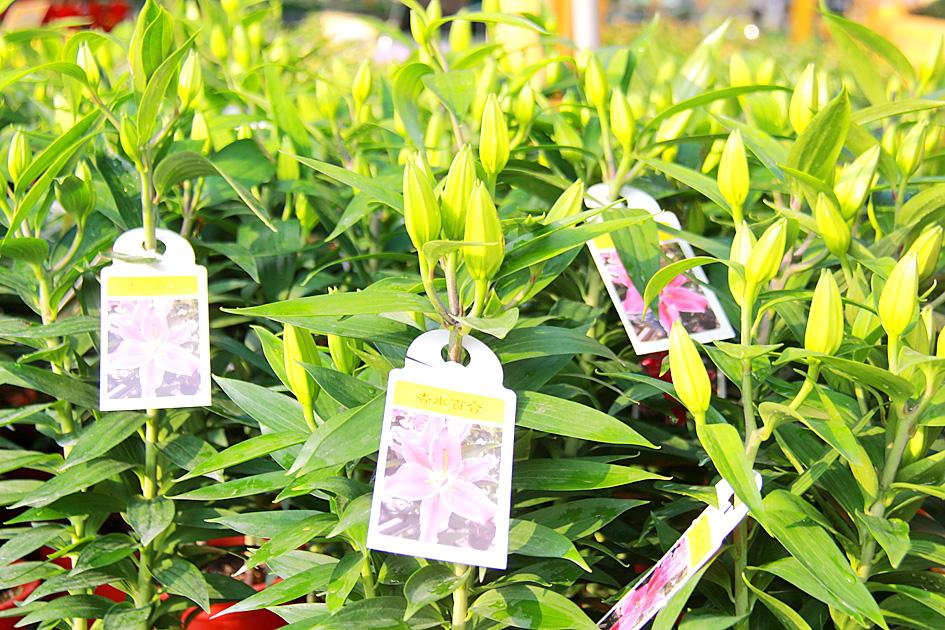Fragrant lilies usually sell well over the Lunar New Year holiday for their symbolic connotations, but have been in especially high demand this year for a surprising reason — to test for COVID-19, flower vendors said on Saturday.
This week, new year lilies fetched about NT$200 for a bouquet of cut flowers and NT$200 to NT$260 for a 5cm planter.
The price has not changed much from previous years, yet they have been selling far better, vendors at Changhua County’s Tianwei Highway Garden said.

Photo: Chen Kuan-pei, Taipei Times
Phoenix Garden owner Hsu Tsai-sheng (許再生) said that lilies usually sell well over the holiday, as their name in Chinese, xiangshui baihe (香水百合), recalls an auspicious phrase commonly said during the holiday, bainian haohe (百年好合).
They also exude a pleasant odor that many people find soothing, but ever since a cluster of domestic COVID-19 cases emerged last month, people have been finding them useful for another reason, Hsu said.
As some COVID-19 infections connected to a cluster at a hospital in Taoyuan might have visited public locations, many people who develop a fever, sore throat or other typical symptoms have become extremely cautious, he added.
Since one of the telltale symptoms is loss of smell, some have been buying fragrant flowers as a COVID-19 test, Hsu said.
Each lily blooms for about 10 days, Hsu said, adding that planters can stretch the lifespan to a month or longer, as they contain three buds that bloom in succession.
In a regular year, Hsu said that he sells 1,000 to 2,000 planters daily over the Lunar New year holiday season.
However, this year, he has already sold all of the flowers that are to bloom by the first day of the New Year, which is Friday, leaving only those that would not bloom until at least five days later, Hsu said.
Even flowers meant for honoring the Taoist Lord of Heaven on the ninth day of the first month of the lunar calendar, Feb. 20 this year, have sold out, Hsu said, adding that he has never seen anything like it before.

A decision to describe a Chinese Ministry of Foreign Affairs statement on Singapore’s Taiwan policy as “erroneous” was made because the city-state has its own “one China policy” and has not followed Beijing’s “one China principle,” Deputy Minister of Foreign Affairs Tien Chung-kwang (田中光) said yesterday. It has been a longstanding practice for the People’s Republic of China (PRC) to speak on other countries’ behalf concerning Taiwan, Tien said. The latest example was a statement issued by the PRC after a meeting between Singaporean Prime Minister Lawrence Wong (黃循財) and Chinese President Xi Jinping (習近平) on the sidelines of the APEC summit

Taiwan’s passport ranked 34th in the world, with access to 141 visa-free destinations, according to the latest update to the Henley Passport Index released today. The index put together by Henley & Partners ranks 199 passports globally based on the number of destinations holders can access without a visa out of 227, and is updated monthly. The 141 visa-free destinations for Taiwanese passport holders are a slight decrease from last year, when holders had access to 145 destinations. Botswana and Columbia are among the countries that have recently ended visa-free status for Taiwanese after “bowing to pressure from the Chinese government,” the Ministry

HEALTHCARE: Following a 2022 Constitutional Court ruling, Taiwanese traveling overseas for six months would no longer be able to suspend their insurance Measures allowing people to suspend National Health Insurance (NHI) services if they plan to leave the country for six months would be abolished starting Dec. 23, NHIA Director-General Shih Chung-liang (石崇良) said yesterday. The decision followed the Constitutional Court’s ruling in 2022 that the regulation was unconstitutional and that it would invalidate the regulation automatically unless the NHIA amended it to conform with the Constitution. The agency would amend the regulations to remove the articles and sections that allow the suspension of NHI services, and also introduce provisional clauses for those who suspended their NHI services before Dec. 23, Shih said. According to

Minister of Labor Ho Pei-shan (何佩珊) yesterday apologized after the suicide of a civil servant earlier this month and announced that a supervisor accused of workplace bullying would be demoted. On Nov. 4, a 39-year-old information analyst at the Workforce Development Agency’s (WDA) northern branch, which covers greater Taipei and Keelung, as well as Yilan, Lienchiang and Kinmen counties, was found dead in their office. WDA northern branch director Hsieh Yi-jung (謝宜容), who has been accused of involvement in workplace bullying, would be demoted to a nonsupervisory position, Ho told a news conference in Taipei. WDA Director-General Tsai Meng-liang (蔡孟良) said he would